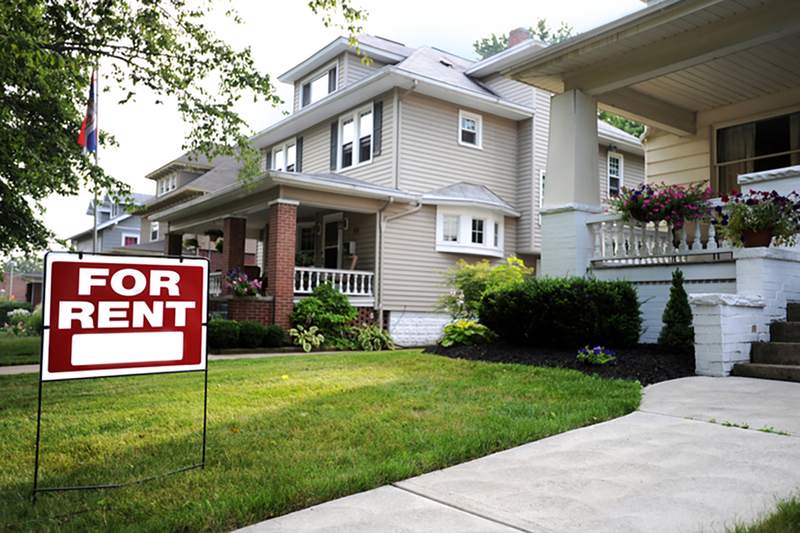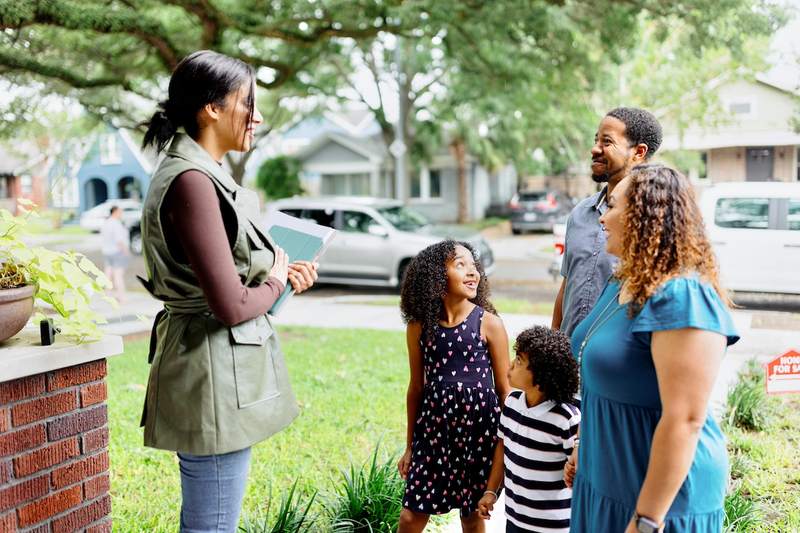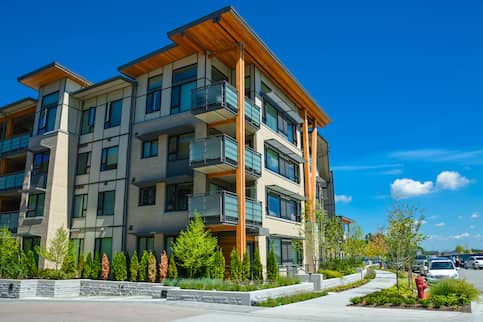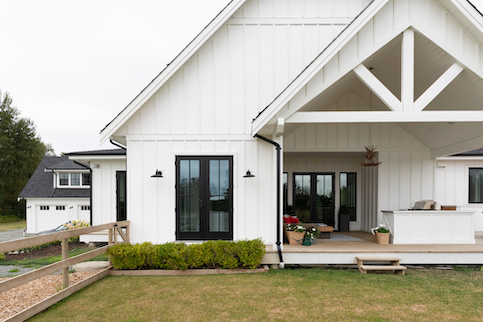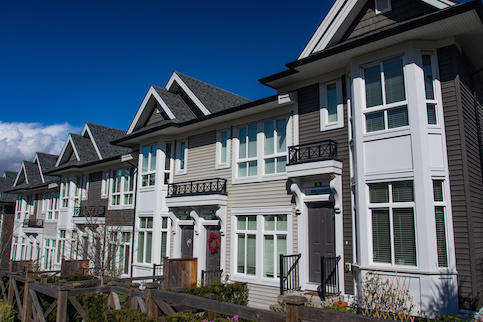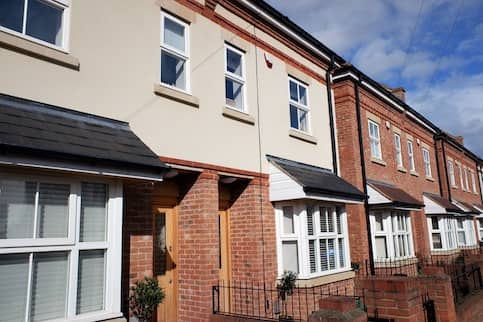For many people, buying a home gives them more than a place to live – it’s also an investment with a good track record of building wealth. But is buying a home always a good investment? Learn more about the benefits and risks of buying a home to decide if it’s the right financial move for you.
Key Takeaways:
- The primary financial benefit of owning a home is building equity, which can be borrowed or turned into profit when you sell your home.
- Owning a home also helps limit your housing costs in the long term, comes with tax benefits, and gives you a place to live where you have control.
- Drawbacks to owning a home include high upfront costs, property taxes, homeowners insurance, maintenance and repairs, and less flexibility to move.
Why Buying A House Is A Good Investment
There are a handful of key reasons why buying a house can be a good investment.
Home Values Generally Appreciate
Buying a home is a good investment because home values have a strong track record of reliably increasing over time.
In the first quarter of 2000, the median sales price for a home in the United States was $165,300. In the first quarter of 2024, that number had risen to $420,800, an increase of 155%. That outpaced inflation by a significant amount, with the dollar inflating by 82% during the same period. If home prices only rose in line with inflation, a $165,300 home would have a value of $305,856 in March 2024 – an 85% increase.
Going back even further, the average median sales price of a home in the first quarter of 1963 was $17,800. While charting the values reveals short stretches where home prices decreased, the growth from that point to the $420,800 value in 2024 is steady.
Long-Term Affordability
While your home value rises, your mortgage payment stays relatively flat. The main ways your mortgage payment may increase are through increases in your property taxes or if you have an adjustable-rate mortgage that adjusts upward. Even then, ARMs have limits on how much your housing costs can rise.
Renters, on the other hand, typically see rents increase each year. During the same period outlined above, the consumer price index for rent in U.S. cities rose 126%, meaning typical rents more than doubled.
Eventually, you’ll pay off the balance of your mortgage. That will eliminate a large portion of your housing costs, leaving you responsible only for property tax payments and keeping the home maintained. If you rent, you never stop paying rent.
You Can Borrow Your Equity
Your home equity will increase both as you pay down your loan and your home’s value appreciates. If you need cash for a major expense, you can borrow your home equity with a home equity loan, line of credit or a cash-out refinance.
As of February 2024, home equity loan rates are around 9%, while the average finance rate for a two-year personal loan at a commercial bank is about 12%.
You typically can borrow up to 80% of your home equity, which is the difference between your home’s current market value and how much you owe on it. If you’ve paid down your mortgage balance and your home has increased in value, you could borrow far more money than you could with the normal limits of about $50,000 on a higher-interest personal loan.
Income Tax Benefits
The best-known tax benefit for homeowners is the mortgage interest deduction. If you itemize your tax deductions, you can deduct the interest paid on up to $750,000 of your mortgage balance from your income when filing your tax return.
Similarly, if you paid for discount points when you got your mortgage or used a home equity loan to pay for home improvements, you can deduct the interest paid on that loan. Property taxes of up to $5,000 for single filers and $10,000 for those married and filing jointly also can be deducted.
You also may be able to deduct home improvements necessary to make your home accessible for medical reasons, as well as home office costs and mortgage insurance.
Another major tax benefit comes when you sell your home. If you use your home as a primary residence for two of the five years before selling, you can exclude up to $250,000 ($500,000 for those married, filing jointly) when calculating the capital gains taxes owed. In other words, if you and your spouse sell your home for a profit of $500,000 or less, you’ll pay no capital gains taxes. If you sell for more than $500,000, you only pay the capital gains tax on the amount exceeding $500,000.
Intangible Benefits Of Homeownership
While these benefits aren’t strictly financial, it’s worth discussing the intangibles of homeownership.
If you’re renting an apartment or even a home, you might not be free to paint the walls the color you like or tear up the backyard to build your dream garden. Plus, there’s always that chance that your landlord will sell the home or not renew your lease.
When you own your home, you have far more control over it. You can choose what improvements to make, completely change the décor, or remodel the entire home. You also don’t have to deal with the uncertainty that comes with each lease renewal.
If you dream of putting down roots and raising a family in a home that you’ll live in for the rest of your life, buying a home is an important step in that process.
What’s Your Goal?
Buy A Home
Discover mortgage options that fit your unique financial needs.

Refinance
Refinance your mortgage to have more money for what matters.
Tap Into Equity
Use your home’s equity and unlock cash to achieve your goals.
Why Buying A House Is A Poor Investment
Buying a house isn’t always a sure thing. It’s important to understand what can make homeownership a net negative financially.
Home Values Can Depreciate
While home values usually rise over time, there are situations where a home’s price can decrease for a period or even in the long run.
For example, a recession can cause home values to fall. In the first quarter of 2007, the median home sold for $257,400. That fell to a low of $208,400, and it didn’t return to its previous heights until the third quarter of 2013, when the median home price reached $258,400.
The real estate market is also highly regional, so prices can fall in some parts of the country even as they rise in others. If a region is struck by major natural disasters or the local economy weakens, it could hurt home prices.
High Upfront Costs
Buying a home requires a lot of upfront costs, which can put homeownership out of reach for many people.
With the exception of specialized loan programs, such as Veterans Affairs or U.S. Department of Agriculture loans, most mortgages require a down payment. Conventional loans need at least 3% down. Putting down less than 20% on a conventional loan means paying for private mortgage insurance.
To buy a home at the average median home price of $420,800, you’d need $12,624 for a 3% down payment. Closing costs, which cover the origination fee for a loan, attorney fees, credit reporting fees and other charges, often total another 2% to 5% of the mortgage amount, adding anywhere from $8,416 to $21,040 to the upfront tab. You’d need at least $21,040 to $33,664 saved to make a minimum down payment on a home at the average median price.
Must Pay Property Taxes
When you own a home, you must pay property taxes based on the home’s assessed value. These taxes don’t help pay for interest charges or pay down the principal of your mortgage. Instead, they go to your local government to help pay for the services that you use.
However, taxes can add up quickly, with average rates ranging from a low of 0.32% in Hawaii to a high of 2.23% in New Jersey. While the average annual property tax bill in 2021 was $1,682, the number ranges from less than $200 in some counties to more than $10,000 a year in some communities in the New York City area.
Property taxes vary significantly from town to town and can change quickly, especially if your home’s value rises. In the worst case, if taxes increase by a significant amount, you might find yourself with a tax bill that is so high that it makes the home you own unaffordable.
Homeowners Insurance Is Required
Your mortgage lender will require you to buy homeowners insurance to protect the property. The cost of insurance varies significantly and has been increasing in recent years.
The average homeowners insurance policy costs $2,377, according to the National Association of Realtors. That amount has increased by 20% over the past two years and is expected to grow by 6% by the end of 2024.
Areas vulnerable to climate change and natural disasters such as flooding, fires and storms can expect the most increases in insurance. The average homeowners insurance policy in Florida in 2023 was $10,996, NAR reports. States where insurance is expected to increase the most include Louisiana, Maine, Michigan and Utah. Some insurance companies have stopped offering policies in some states, forcing homeowners to scramble to find a new insurer or turn to state-run programs of last resort.
For homeowners, insurance costs can quickly balloon, making it difficult to afford a home and offsetting many of the financial benefits of ownership.
Maintenance And Repairs
A major advantage of renting is that you’re not responsible for repairs or maintenance. Homeowners have no such protection. You have to cover the expense of keeping your home in good condition and come up with the cash to handle any significant damage to your home.
“Think about realistic monthly maintenance costs, which should be budgeted for,” says R.J. Weiss, a Certified Financial Planner based in Geneva, Illinois. “A common rule of thumb is to allocate 1% of your home’s value annually for maintenance. So, for a $400,000 home, you should set aside $4,000 a year for upkeep.”
The costs can add up quickly, whether it’s a leaking roof, a broken water heater or more minor repairs.
Building Equity Takes Time
It’s also important to keep in mind that building equity takes time. At first, most of your mortgage payments will go toward interest, so your equity will grow very slowly.
Imagine you wanted to buy a $500,000 home. You make a 20% down payment, getting a $400,000 mortgage at 7%. Your equity starts at $100,000.
Your monthly payment will be $2,661. With your first payment, only $328 will go toward the principal, and the rest will go toward interest. After a full year of payments, where you pay $31,932, the loan balance will only have dropped to $395,937.
Nearly $32,000 of payments will earn you just over $4,000 in equity. It takes more than 20 years to pay off half of the loan’s balance.
It takes a long time to see the benefits of home equity. “Generally, it’s best to stay in a home for at least five years, ideally a minimum of 10,” Weiss says. If you have to sell your home a few years after moving in, you might lose money after covering transaction costs.
Ready To Become A Homeowner?
Get matched with a lender that can help you find the right mortgage.
Is Buying A House Worth It? Pros and Cons
Before you decide to buy a home, take a moment to consider the pros and cons.
Pros
Some of the reasons buying a home can be worth it include:
- Home values tend to rise. Homes tend to become more valuable as time passes, so buying a home means buying an appreciating asset.
- Build equity. When you pay rent, the entire payment goes to your landlord. You don’t get any future benefit from it. When you buy a home, some of your mortgage payment reduces the principal balance of your loan, helping you build equity. You can later borrow that equity or turn it into a profit by selling your home.
- Tax benefits. If you itemize on your tax return, there are many deductions that homeowners can take advantage of.
- Stable housing costs. Your mortgage payment is relatively fixed, unlike rent, which can change. You also don’t have to worry about whether your landlord will renew the lease.
- More control. When you own your home, you have more control over things like remodeling or making upgrades.
Cons
Some drawbacks of buying a home include:
- High upfront costs. Between a down payment and closing costs, you’ll likely need tens of thousands of dollars saved to buy a home.
- Unexpected expenses. When you own your home, you have to be able to cover the cost of unexpected repairs, which can get expensive.
- Property taxes, insurance and other costs. Mortgage payments are just one part of paying for a home. As a homeowner, you’ll need to pay for home insurance, HOA fees, property taxes and utilities, which all increase the price of ownership.
- Less flexibility. When you’re renting, it’s easy to decide not to renew your lease and to move somewhere new. If you own your home, you lose that flexibility because selling a home can be costly and take a long time.
Pros And Cons Of Investing In Buying A Home
| Pros | Cons |
|---|---|
| Home values tend to rise | High upfront costs |
| Build equity | Unexpected expenses |
| Tax benefits | Property taxes, insurance and other costs |
| Stable housing costs | Less flexibility |
| More control |
Take The First Step To Buying A Home
Find a lender that will work with your unique financial situation.
FAQ
Here are answers to common questions about whether buying a home is a good investment.
Historically, stocks have produced higher returns than real estate, so buying stocks will likely produce a better outcome if you’re looking purely for financial return. However, if the thought of homeownership appeals to you and you plan to own a home for a long time, buying can still be a good idea with financial benefits.
The Bottom Line
Homeownership is a lifestyle choice as much as a financial decision. If you want to own your home and put down roots, that should play a role in whether you buy a home. The fact that buying a home is a good investment for many people, particularly those who keep their home for a long time, is a bonus and another reason to consider buying a home.
More From Quicken Loans:
Dan Rafter contributed to the reporting of this article.

T.J. Porter
T.J. Porter is a Boston-based writer who focuses on credit cards, credit and bank accounts. When he's not writing about all things personal finance, he enjoys cooking, esports, soccer, hockey, and games of the video and board varieties.

